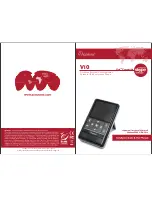
D14869.11
Codec C20 API Reference Guide TC7.0, JANUARY 2014.
Copyright © 2010–2014 Cisco Systems, Inc. All rights reserved.
103
Cisco TelePresence System Codec C20
API Reference Guide
xCommand Phonebook Search
The search command lets you search in both the local and corporate phone books. A search gives
a ResultSet.
PhonebookId: The identifier of the phonebook server that will be used. See the xConfiguration
Phonebook Server ID setting. Not necessary to use.
PhonebookType: Define whether to search the local phone book or the corporate phonebook.
SearchString: Search for entries containing this string (note that the entry does not have to begin
with the string). If no FolderId is specified, all folders / phonebook directories will be searched. The
SearchString parameter is optional for software version TC2.0 and later.
SearchField: Currently not in use.
Offset: Get records starting with this offset in a search. The default value is 0. Offset is used
together with Limit to support paging.
FolderId: Search only in the specified folder. The FolderId (string) is listed in the ResultSet of a
search result containing folders.
Limit: Limit the number of records in the result set to this number. For example, if the limit is set to
10, the ResultSet will contain only 10 entries (Contacts and Folders) even if the total number of hits
is larger. The maximum limit is 1000.
Recursive: This parameter will only have effect when searching the local phone book. The setting
determines whether a local phone book search should be limited to the given FolderId, or also
recursively search in its subfolders. If not specified, the search will be recursive.
When issuing the command without specifying any parameters, all folders, contacts and contact
methods in the local phone book will be returned.
Requires user role:
USER
Parameters:
PhonebookId: <S: 0, 255>
PhonebookType: <Corporate/Local>
SearchString: <S: 0, 255>
SearchField: <Name/Number>
Offset: <0..65534>
FolderId: <S: 0, 255>
Limit: <0..65534>
Recursive: <False/True>
ContactType(o): <Any/Folder/Contact>
Example:
xCommand Phonebook Search PhonebookType:Corporate Limit:2
FolderId:"corporate _ 001"
OK
*r PhonebookSearchResult ResultSet ResultInfo TotalRows: 25
*r PhonebookSearchResult ResultSet Contact 1 Name: "John Doe (office)"
*r PhonebookSearchResult ResultSet Contact 1 ContactId: "localContactId-3"
*r PhonebookSearchResult ResultSet Contact 1 ContactMethod 1 ContactMethodId: "1"
*r PhonebookSearchResult ResultSet Contact 1 ContactMethod 1 Number: "H323:John.
[email protected]"
*r PhonebookSearchResult ResultSet Contact 1 ContactMethod 1 Protocol: H323
*r PhonebookSearchResult ResultSet Contact 1 ContactMethod 2 ContactMethodId: "2"
*r PhonebookSearchResult ResultSet Contact 1 ContactMethod 2 Number: "SIP:John.
[email protected]"
*r PhonebookSearchResult ResultSet Contact 1 ContactMethod 2 Protocol: SIP
*r PhonebookSearchResult ResultSet Contact 2 Name: "John Doe (home)"
*r PhonebookSearchResult ResultSet Contact 2 ContactId: "localContactId-4"
*r PhonebookSearchResult ResultSet Contact 2 ContactMethod 1 ContactMethodId: "3"
*r PhonebookSearchResult ResultSet Contact 2 ContactMethod 1 Number: "H323:John.
[email protected]"
*r PhonebookSearchResult ResultSet Contact 2 ContactMethod 1 Protocol: H323
*r PhonebookSearchResult ResultSet Contact 2 ContactMethod 2 ContactMethodId: "4"
*r PhonebookSearchResult ResultSet Contact 2 ContactMethod 2 Number: "SIP:John.
[email protected]"
*r PhonebookSearchResult ResultSet Contact 2 ContactMethod 2 Protocol: SIP
** end
Contents
Introduction
About the API
xConfiguration
Appendices
xCommand
xStatus
xCommand
















































